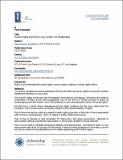|
Reseña:
|
This article considers several explanations for the international human rights movement’s sudden heightened attention to rule of law. The human rights movement has increasingly encountered conceptual, normative and political challenges. Perhaps, as de Mello suggested, rule of law will be a “fruitful principle to guide us toward agreement and results,” and “a touchstone for us in spreading the culture of human rights.” We still live in a world where widespread human rights violations are the norm rather than the exception. Rule of law is seen as directly integral to the implementation of rights. Rule of law may also be indirectly related to better rights protection in that rule of law is associated with economic development, which is related to better rights performance. Rule of law is integral to and necessary for democracy and good governance. Attempts to democratize without a functional legal system in place have resulted in social disorder. Rule of law is said to facilitate geopolitical stability and global peace. According to some, it may help prevent wars from occurring in the first place. It also provides guidelines for how war is carried out, and is central to the establishment of a rights-respecting post-conflict regime. Post 9-11 concerns over terrorism have also focused attention on rule of law. In addition, rule of law provides a rhetorical basis for challenging the world’s sole reigning superpower. Taking each of these factors in turn, I critically analyze the relationship between rule of law and human rights. The relationship is complex and defies easy summary across such a broad range of issues. Nevertheless, a provisional summary that highlights some of the key findings and conclusions may be helpful. First, on the whole, rule of law is desirable. However, it is clearly no panacea for any of these problems. Second, rule of law is more useful in addressing some concerns than others. Appealing to rule of law will do little to resolve the conceptual and normative difficulties at the core of the human rights agenda. Third, the empirical evidence to support the assertion that rule of law leads to more rights and wellbeing is limited, and subject to doubts about causality. There is good reason to believe that wealth rather than rule of law is mainly responsible for better rights performance, although rule of law may also have some independent impact. Fourth, although rule of law and liberal democracy generally go hand in hand, they need not. Rule of law is possible in non-democratic states, and in democratic but non-liberal states. Rule of law may proceed, and is generally a precondition for, democratic consolidation. Fifth, we should not put too much faith in the ability of rule of law to prevent war, limit atrocities during war, or rein in a superpower bent on going its own way. Finally, rule of law is only one component of a just society. In some cases, the values served by rule of law will need to give way to other values. Invoking rule of law in most cases signals the beginning of normative and political debate, not the end of it. |



